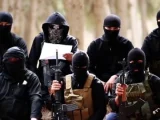
Taliban’s Denial and the Real Threat of Terrorism from Afghanistan
September 2, 2024The Taliban’s Ministry of Foreign Affairs has denied Pakistan’s envoy’s warning about a potential 9/11-style attack from Afghanistan as false and misleading. This response comes amid rising terrorist activities in the region.
Despite Taliban assurances of stability, Afghanistan has seen an increase in attacks by ISIS-K and other extremist groups. This persistent violence contradicts the Taliban’s claims of maintaining order and highlights the ongoing threat from these groups.
The Afghan government’s denial of terrorism emanating from its territory fails to address the evidence of cross-border terrorism. The uptick in attacks by the Tehrik-i-Taliban Pakistan (TTP) since the Taliban’s takeover suggests that Afghanistan remains a refuge for extremist elements.
High-profile terrorist figures have been killed either by international forces or in internal clashes within Afghanistan. These events underscore the country’s role as a breeding ground for terrorism, validating concerns about its security environment.
Recent conditions in Afghanistan, including the resurgence of terrorist groups, resemble the pre-9/11 scenario when a lack of international focus allowed extremist networks to thrive. This situation raises legitimate fears of another large-scale attack originating from the country.
Events such as the August 2021 Kabul airport bombing, carried out by ISIS-K and resulting in over 170 casualties, and ongoing clashes between the Taliban and ISIS fighters, emphasize the volatility of Afghanistan. These incidents highlight the country’s ongoing instability and security challenges.
The Taliban’s inability or unwillingness to address the influence of groups like ISIS-K and the TTP not only destabilizes Afghanistan but also threatens neighboring countries, including Pakistan. Ambassador Durrani’s warning about the potential for a 9/11-style attack is thus grounded in the current realities of Afghanistan’s security landscape.
Ignoring the signs of growing extremism in the region could have dire consequences. The international community must take these threats seriously to prevent further escalation and ensure regional stability.
To summarize, while the Taliban may deny the presence of terrorist threats, the evidence of ongoing extremist activities in Afghanistan is clear. Addressing these threats requires a concerted effort to stabilize the region and counter the rise of terrorism.

